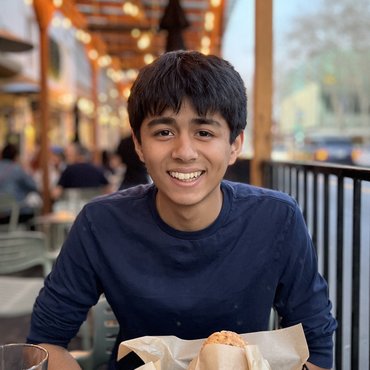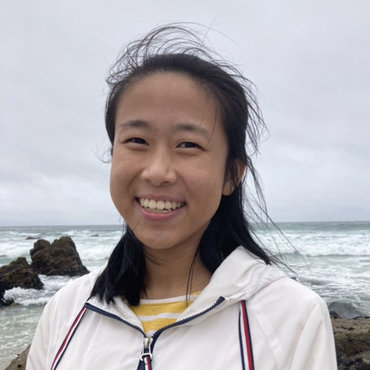
Kellen Vu, ’23
The language of persimmons: Connecting with workers on campus
Luci's love language was persimmons.
Every time I met with her for an English coaching session, she would offer me one. The orange fruit would make a satisfying crunch when I took a bite.
The persimmons became a symbol of our friendship—a unique connection between student and worker. Luci and I met through Habla, a student organization that provides personalized language instruction to Stanford's custodial staff. Our mission is to improve the quality of life for low-wage service workers and their families by supporting their English-learning goals.
I joined Habla because I wanted to support a historically marginalized community while also putting my Spanish-speaking skills to use. On campus, I met with Luci twice a week to teach her English. Luci was a fast learner. It was satisfying to see her face light up when a concept clicked. One day, a few weeks into our lessons, she greeted me with a huge smile. She told me that a student had asked her for directions to Coupa Cafe, and she was able to answer confidently in English. That day, the persimmons tasted even sweeter than usual.
Things were going great—until COVID. In March 2020, Stanford sent students home, and Habla had to figure out how to adapt to the virtual setting. This was a disruptive time for everyone, but especially for the workers because many of them were being laid off. Some Habla coaches would reach out to their learners to continue lessons, only to find out that they no longer worked at Stanford.
During this tough time, I decided to step up my involvement in Habla by joining the leadership team as the director of communications. I helped facilitate communication between coaches and learners to ensure that everyone's needs were met. I was also responsible for creating the website and designing educational content for both students and workers.
One of my concerns when COVID hit was that the workers might not be interested in English lessons anymore. After all, they might have more pressing pandemic-related priorities. But when we reached out to the workers, an overwhelming majority wanted to continue with Habla. It turns out that English was an even more valuable skill during COVID because they needed to fill out forms, read information, and communicate with doctors and employers.
That's when I realized how impactful Habla truly is: in the midst of a pandemic when workers were at risk of losing their jobs, Habla was one of the few support networks they had.
With this realization, we decided to do everything we could to strengthen that network. We translated resources about COVID. We partnered with organizations like Students for Workers’ Rights to advocate for our learners. During the holidays, we recruited students both inside and outside of Habla to call workers and wish them well. And we organized a letter-writing campaign where over 100 students wrote personalized thank-you notes to the workers.
The response to our efforts was amazing. The workers were so pleased to see that students cared about them, especially during such a difficult time. Here is just one example of a message that we received in response to the letter-writing campaign:
“Wow, muchas gracias de verdad. Me hace sentir muy contento al leer esas palabras muy alentadoras y llenas de sinceridad. Yo también te doy las gracias por todo lo que haces. No es fácil ser maestro, especialmente en estos tiempos.” (“Wow, thank you so much, truly. It makes me very happy to read those encouraging words full of sincerity. I, too, am grateful for everything you do. It’s not easy being a teacher, especially in these times.”)
Since then, Habla has only grown in size and impact. In the 2021-22 academic year, we matched over 50 workers to student coaches and provided over 370 hours of ESL coaching.
An important lesson I've learned from Habla is that there are countless meaningful connections waiting to be made if you just take the first step of reaching out. So, the next time you bump into a service worker you see regularly on campus, introduce yourself! Ask their name. It might seem like just a little bit of small talk, but it could be more meaningful than you think.


